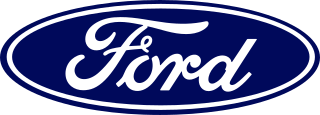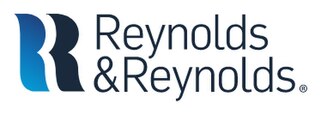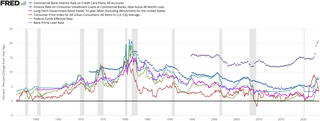Related Research Articles
The DeLorean Motor Company (DMC) was an American automobile manufacturer formed by automobile industry executive John DeLorean in 1975. It produced just one model, from early 1981 to late 1982—the stainless steel DeLorean sports car featuring gull-wing doors. Its history was brief and turbulent, ending in receivership and bankruptcy in 1982. In October 1982, John DeLorean was videotaped in a sting operation agreeing to bankroll drug trafficking, but was acquitted at the subsequent trial on the basis of entrapment.

In the United States, a car dealership is a business that sells cars. A car dealership can either be a franchised dealership selling new and used cars, or a used car dealership, selling only used cars. In most cases, dealerships provide car maintenance and repair services as well as trade-in, leasing, and financing options for customers.
An asset-backed security (ABS) is a security whose income payments, and hence value, are derived from and collateralized by a specified pool of underlying assets.

Ford Motor Credit Company LLC, d/b/a Ford Credit, is the financial services arm of Ford Motor Company, and is headquartered in Dearborn, Michigan.
In the United States, VIN etching is a countermeasure to motor vehicle theft, that involves etching a vehicle's VIN onto its windows to reduce the value of a stolen vehicle to thieves. The Federal Trade Commission includes VIN etching on a list of upsold services including extended warranties, service and maintenance plans, payment programs, guaranteed automobile or asset protection, emergency road service, and other theft protection devices, and warns consumers about the practice of upselling when buying a vehicle.

A car dealership, or car dealer, is a business that sells new or used cars, at the retail level, based on a dealership contract with an automaker or its sales subsidiary. Car dealerships also often sell spare parts and automotive maintenance services.

AutoNation is an American automotive retailer based in Fort Lauderdale, Florida, which provides new and pre-owned vehicles and associated services in the United States. The company was founded by Wayne Huizenga in 1996, starting with twelve AutoNation locations, and now has more than 300 retail outlets.
A secured transaction is a loan or a credit transaction in which the lender acquires a security interest in collateral owned by the borrower and is entitled to foreclose on or repossess the collateral in the event of the borrower's default. The terms of the relationship are governed by a contract, or security agreement. In the United States, secured transactions in personal property are governed by Article 9 of the Uniform Commercial Code (U.C.C.).

The Reynolds and Reynolds Company is a private corporation based in Dayton, Ohio. Its primary business is providing business forms, management software and professional services to car dealerships. Its software is used to manage sales logistics at dealerships. It also produces forms used in medicine and insurance.
Founded in 1921 as Australian Guarantee Company to initially provide finance for purchasers of smaller household items, it progressed into financing motor vehicles and was renamed as Australian Guarantee Corporation (AGC) in 1925. AGC was Australia's oldest national finance company offering a range of finance, investment and insurance products and were market leaders in equipment finance, cashflow finance, motor vehicle and personal finance.

Lithia Motors, Inc. is an American nationwide automotive dealership group headquartered in Medford, Oregon. It is the third largest new vehicle automotive dealership group in the United States, below AutoNation and Penske Automotive Group. As of October, 2023, Lithia operates 291 stores in the United States, 14 stores in Canada and 40 in the United Kingdom. As of May 2022, Lithia operates 267 stores in 24 states, and 14 in Canada. Lithia Motors employs approximately 21,150 people.

Auto auctions are a method of selling vehicles based on an auction system. Auto auctions can be found in most countries and are usually exclusive to licensed automobile dealers. In a few countries, such as Japan, auto auctions are well known and used by most residents.

Car finance refers to the various financial products which allow someone to acquire a car, including car loans and leases.
In the used car market in the United States and Canada, buy here, pay here, often abbreviated as BHPH, refers to a method of running an automobile dealership in which dealers themselves extend credit to purchasers of automobiles. Typically, purchasers of cars at BHPH dealerships have poor credit history, and loans have high interest rates. BHPH can provide options for those unable to meet credit standards elsewhere.

DriveTime Automotive Group Inc. is an American used car retailer and finance company. It is based in Tempe, Arizona, and sells and finances cars to customers around the nation. The company was formerly known as Ugly Duckling and was renamed DriveTime in 2002. It also spun off Carvana and GO Financial, SilverRock Group Inc, and Bridgecrest Acceptance Corporation. As of 2018, DriveTime had approximately 145 locations in the U.S. and 3,800 employees.
Vehicle insurance in the United States is designed to cover the risk of financial liability or the loss of a motor vehicle that the owner may face if their vehicle is involved in a collision that results in property or physical damage. Most states require a motor vehicle owner to carry some minimum level of liability insurance. States that do not require the vehicle owner to carry car insurance include Virginia, where an uninsured motor vehicle fee may be paid to the state, New Hampshire, and Mississippi, which offers vehicle owners the option to post cash bonds. The privileges and immunities clause of Article IV of the U.S. Constitution protects the rights of citizens in each respective state when traveling to another. A motor vehicle owner typically pays insurers a monthly or yearly fee, often called an insurance premium. The insurance premium a motor vehicle owner pays is usually determined by a variety of factors including the type of covered vehicle, marital status, credit score, whether the driver rents or owns a home, the age and gender of any covered drivers, their driving history, and the location where the vehicle is primarily driven and stored. Most insurance companies will increase insurance premium rates based on these factors, and less frequently, offer discounts.

Vehicle mats, also known as "automobile floor mats", are designed to protect a vehicle's floor from dirt, wear, and salt corrosion.
CarGurus, Inc. is a Cambridge, Massachusetts-based automotive research and shopping website that assists users in comparing local listings for used and new cars, and contacting sellers.
Hero FinCorp, an associate company of Hero MotoCorp, is an Indian Non-banking financial company (NBFC). The company is currently engaged in consumer finance businesses and commercial lending. Consumer Finance includes financing Hero MotoCorp Two Wheeler, Loyalty Customer Loans and providing Loans against property. On the commercial lending side it provides Indian corporates with a wide portfolio of financing products which include working capital loans, machine loans among others. It is a captive finance company of Hero MotoCorp Ltd.
The electric car company Tesla, Inc. has faced dealership disputes in several U.S. states as a result of local laws. In the United States, direct manufacturer auto sales are prohibited in many states by franchise laws requiring that new cars be sold only by independent dealers.
References
- ↑ "Floorplan 101 - What You Need To Know" (PDF). Archived from the original (PDF) on 2013-03-20. Retrieved 2013-06-12.
- ↑ "What is floor plan financing?". SBA.gov. Archived from the original on 2013-06-06. Retrieved 2013-06-12.
- ↑ Ransom, Kevin (2016-11-21). "How Car Dealers Are Run". www.autoblog.com. Retrieved 2019-03-04.
- ↑ Dreisbach, Scott (2007-05-15). "Taming The Floor Plan Monster". www.autodealertodaymagazine.com. Retrieved 2019-03-04.
- ↑ "Dealer Floor Plans". nada.org. 13 November 2017. Retrieved 2019-06-20.[ dead link ]